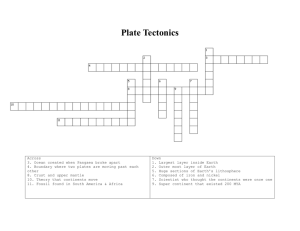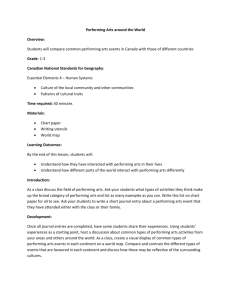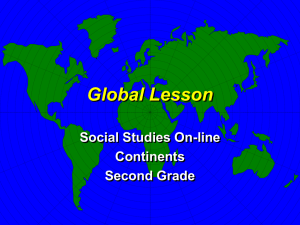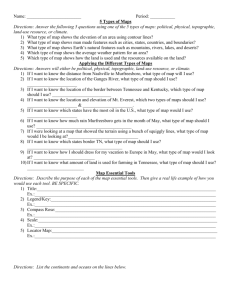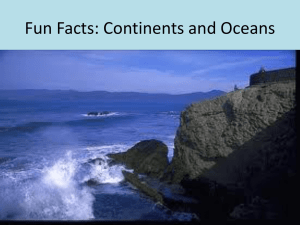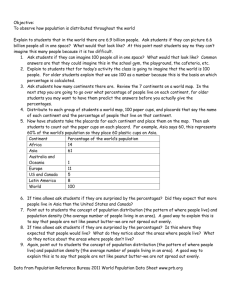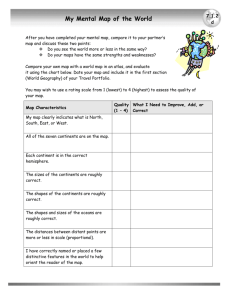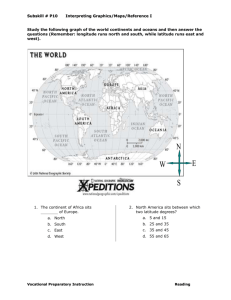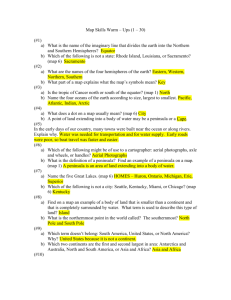THE SEVEN CONTINENTS By M. B. Caballero
advertisement
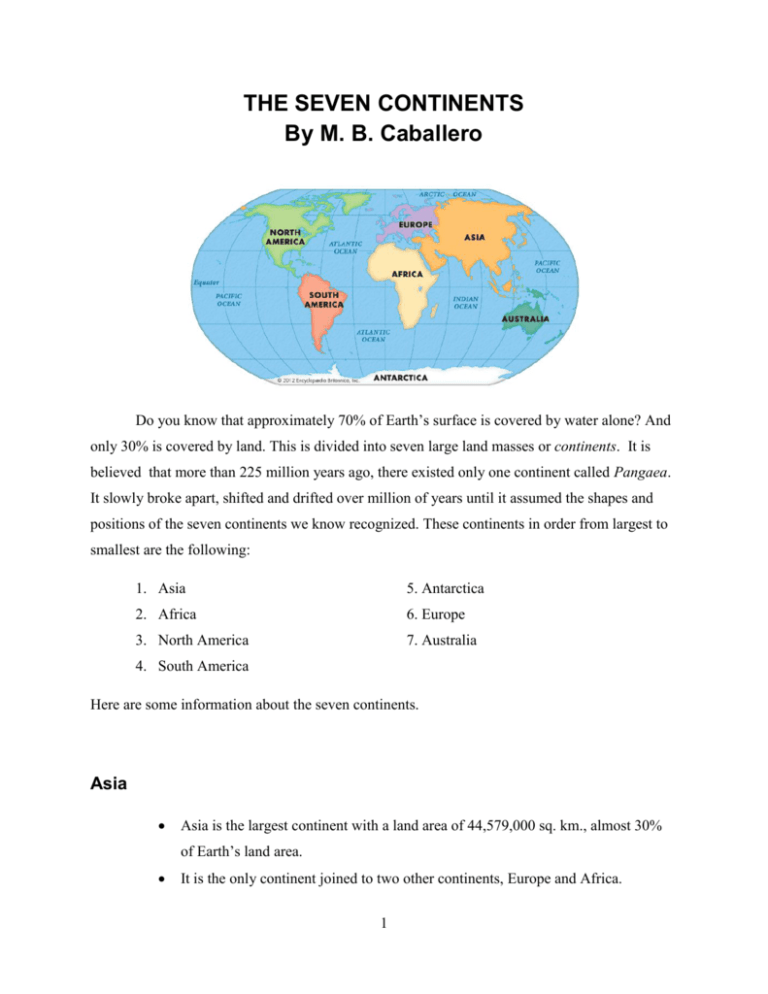
THE SEVEN CONTINENTS By M. B. Caballero Do you know that approximately 70% of Earth’s surface is covered by water alone? And only 30% is covered by land. This is divided into seven large land masses or continents. It is believed that more than 225 million years ago, there existed only one continent called Pangaea. It slowly broke apart, shifted and drifted over million of years until it assumed the shapes and positions of the seven continents we know recognized. These continents in order from largest to smallest are the following: 1. Asia 5. Antarctica 2. Africa 6. Europe 3. North America 7. Australia 4. South America Here are some information about the seven continents. Asia Asia is the largest continent with a land area of 44,579,000 sq. km., almost 30% of Earth’s land area. It is the only continent joined to two other continents, Europe and Africa. 1 It has the largest population with 3,879,000 people or 60% of the total human population living there. It is composed of 47 independent countries including the Philippines and China, the world’s biggest nation. Asia is the birthplace of great religions like Hinduism, Islam, Buddhism and Christianity. It is a continent of diversity, being a home to some of the richest and most developed economies in the world (ex. Japan and Korea) and the poorest countries in the world (ex. Afghanistan and Bangladesh). Asia has varied climates due to its wide range. Its climate is greatly affected by monsoon winds. Rain is experienced from April to October. It has the widest varieties of plant and animals. Interesting Facts about Asia: - It is only continent where tigers are found in the wild. - The highest point on Earth, Mt. Everest, and the lowest point on Earth, Dead Sea Shore, are both found in Asia. Mt. Everest in Nepal, is the highest point on Earth and the highest mountain in the world rises 29,028 feet above sea level. 2 Dead Sea Shore, the lowest place on Earth, is located between Israel and Jordan. Africa Africa is the second largest continent with a land area of 30,221,532 sq.km or 22% of the Earth’s land area. It ranks second among continents in population with a little over a billion people It is the continent with the most number of countries (53) and a number of island groups. It was called Dark Continent for a long time because little was known about it due to its difficult terrains. It is a vast plateau broken by some mountain ranges and narrow coastal plains. Its climate is dominated by a warm and hot weather conditions. Most of Africa is desert region. It is home to the poorest people in the world. Africa is extremely rich on mineral and natural resources. It is home to many exotic large mammals like 95% of the world’s diamonds and 50% of gold come from Africa zebras, giraffes, elephants, antelopes and rhinoceros. Interesting Places in Africa: Sahara, world’s largest desert, occupies an area almost as large as the entire USA. 3 Nile, world’s longest river, is more than 4,000 miles long. North America The third largest continent with a land area of 24,709,000 sq.km or 16.5% of Earth’s land area. It is around twice the size of Europe. North America is roughly triangular in shape and surrounded by the Arctic , Atlantic and Pacific Oceans. It is joined to Asia by ice during winter. It ranks fourth among continents in population with nearly 529 million people. North America consists of 23 countries including the two world’s most developed countries, United States of America and Canada. It is the only continent that has every kind of climate from dry to bitter cold of the Arctic to steamy heat of the tropics. It has some unusual kind of climates, which cannot be found in the other parts of the world. It has very rich mineral and other natural resources. It is the world’s largest corn and soybean producer and the largest wheat and sugar exporter. It produces 25% of the world’s milk and dairy products. It is home of Apple, Facebook, Google and many other world famous technology companies. Interesting Places in North America: Mt. Kea or Mauna Kea is the world’s tallest mountain with a height of 33,500 feet, more than twice of Mt. Everest. However, much of Mt. Kea is below sea level. 4 Lake Superior, world’s largest freshwater lake, is located in the border between U.S. and Canada. South America It is the fourth largest continent with a land area of 17,840,000 sq.km. or 12% of world’s land area. It is almost totally surrounded by water. The Carribbean sea lies to its north, Atlantic Ocean to the east and northeast and to the south, the Drake passage which separates in from Antarctica. It is the fifth most populous continent with nearly 386 million people or 6% of world’s total population. It is often refered as Latin America. The major languages spoken are Spanish and Portuguese. It has a wet tropical climate and have a heavy cover of rain forest. However, the climate of the continent varies from places to places. South America has abundant mineral resources like gold, iron and silver which have not been thoroughly exploited. It is home to Brazil, the world’s largest coffee producer. Interesting Facts: Amazon River Basin is the world’s largest river system. 5 Angel Falls is the highest waterfalls in the world. Antarctica Antarctica is the sixth largest continent with a land area of 14 million sq.km. But, if it did not have its ice cap it would be the smallest continent. Stormy waters of the Atlantic, Indian and Pacific Oceans isolate it from other continents. It looks all white with ice and snow covering 98% of the continent. It is sometimes refered as the “White Continent”. It is a true desert due to its extreme cold climate making it the coldest, windiest and driest place on Earth. It is the only continent with no permanent human residents. Although some scientists live there for a short period of time. Only cold-adapted floras and faunas, like penguins and seals, can survive there. But it has a rich marine life. Interesting Facts about Antarctica: - It contains 75% of the ice in the world. - Its deepest ice is more than 10 times the height of Sears Tower, one of the world’s tallest buildings. - The world’s lowest temperature have been recorded there at -89.2°C (-129°F). Europe Do you know that? Because Europe and Asia Europe is the second smallest continent in the occupy the same landmass, world with an area of 10,180,000 sq.km. It ranks third in population 731 million people they are sometimes (12.5% of the world’s total population). collectively called Eurasia. The continent is surrounded by the Black and Mediterranean Seas and the Arctic and Atlantic Ocean. It has 50 countries including Russia, the world’s largest country. Most of Europe experiences mild weather caused by the winds from the Atlantic Ocean. It has come to represent a unique civilization and ethical values which had greatly influenced the rest of the world. Eiffel Tower in Paris, France 6 It has wide variety of mineral resources like coal, copper, lead and natural gas. Interesting Facts: - Through colonization, at one time ruled almost the whole world. - It has been the starting point of World War I and World War II. St. Peter’s Basilica in Vatican City, the world’s smallest city. Australia Australia is the smallest of the 7 continents with a land area of 8,468,300 sq.km. It is completely surrouned by water. It is the only country that is also a continent. Australia is predominantly plains. It ranks 6th in population with 31,260,000 people living there. Being located in the tropics, it sees a warm and hot climate throughout the year. Australia is famous for its vast wildlife and rare species. It is home to three unique animals: the platypus, kangaroos and emu, a large bird that does not fly . It is also known for its various type of Eucalyptus trees. Interesting Facts about Australia: The sheep population is 14 times more than than its human population. Great coral reef, the world’s largest coral reef, is made up of coral deposits which is 2000 km long. 7 The table below summarizes some of the geographical and demograpical data of the seven continents. Continent Asia Africa North America South America Antarctica Europe Australia Land Area (km²) 44,579,000 30,221,532 24,709,000 17,840,000 14,000,000 10,180,000 8,468,300 Population (people) 3,879,000,000 1,000,010,000 528,720,588 385,742,554 0 731,000,000 31,260,000 Population Density (People per km²) 89 30.51 22.9 21.4 0 70 3.7 Countries 47 53 23 13 50 3 Rank the continents from largest to smallest based on population density. 1. _____________________________ 5. ______________________________ 2. _____________________________ 6. ______________________________ 3. _____________________________ 7. ______________________________ 4. _____________________________ Sources: http://www2.aes.ac.in/mswebsite_07/teachersites/mtabor/1_Geography/Geo_skills/Land_Water/ Continents.pdf http://www.funsocialstudies.learninghaven.com/articles/continents.htm http://www.mapsofworld.com/world-continent-map.htm http://www.gfmag.com/tools/global-database/economic-data/12147-the-poorest-countries-in-theworld.html#axzz2J2kdJMvB http://en.wikipedia.org/wiki http://www.britannica.com 8
